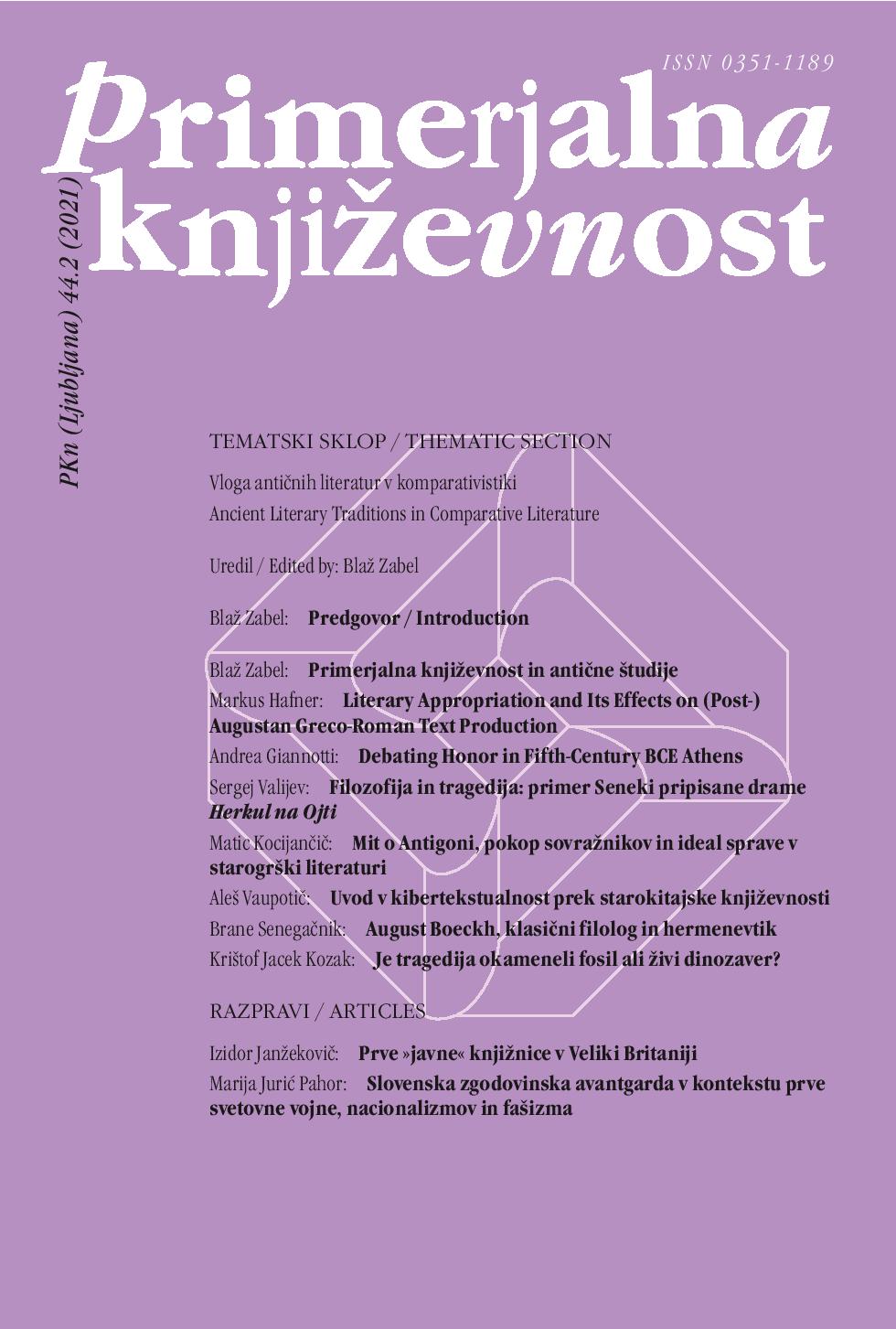Debating Honor in Fifth-Century BCE Athens: Towards a Comparative and Intradisciplinary Approach
DOI:
https://doi.org/10.3986/pkn.v44.i2.03Keywords:
literature and ethics, ancient Greek drama, epigraphy, Euripides, Aristotle, moral philosophy, honorAbstract
This article tries less to give a practical demonstration than to theoretically sketch out and propose a novel approach to a specific aspect of ancient Greek culture, namely τιμή (honor) and the pursuit of it. Its aim is not only to illustrate the potential proficiency of such a methodology (and to set the ground for its application), but also to highlight concrete opportunities in the Humanities to study how the language of civic institutions in epigraphic sources and the moral language of ethical philosophy penetrate poetry in Greece: the idea that inscriptions and ethical philosophy are something that scholars of poetry should leave to ancient historians and philosophers has left lots of room for new scholarship in this area. Special attention is devoted here to Euripidean drama and its characters who, in exhibiting specific virtues (e.g. benevolence, solidarity, and friendship) while establishing reciprocal relationships, stand as socio-ethical examples of the pursuit of an honorable status within one’s community. Scholars have not fully explored to what extent this portrayal matches historical evidence for benefactions/exchanges between Greek citizens/cities and, at the same time, it complies with the virtues described by Aristotle’s ethical works. By interpreting honor as a means by which people regulate their social lives, the objective of this article is to show how Euripidean drama can serve as a valuable source to be explored for understanding Greek moral attitudes.
References
Aloumpi, Myrto. <em>The Civic Virtue of</em> Philotimia. <em>Rhetoric, Ideology, and Politics in Democratic Athens</em>. DPhil dissertation. Oxford: Oxford University, 2018.
Appiah, Kwame A. <em>The Honour Code. How Moral Revolutions Happen</em>. New York, NY; London: Norton, 2010.
Arrowsmith, William. “Nietzsche: Notes for ‘We Philologists’.” <em>Arion</em> 1.2 (1973–1974): 279–380.
Branham, Robert B., Glenn W. Most, Ralph Hexter, Giulia Sissa, Daniel Selden, Page duBois, and Walter R. Johnson. “Panel Discussion. Classics and Comparative Literature: Agenda for the ‘90s.” <em>Classical Philology</em> 92.2 (1997): 153–188.
Barbato, Matteo. <em>The Ideology of Democratic Athens. Institutions, Orators and the Mythical Past</em>. Edinburgh: Edinburgh University Press, 2020.
Belfiore, Elizabeth S. <em>Murder among Friends. Violation of</em> Philia <em>in Greek Tragedy</em>. New York, NY; Oxford: Oxford University Press, 2000.
Blundell, Mary W. <em>Helping Friends and Harming Enemies. A Study in Sophocles and Greek Ethics</em>. Cambridge: Cambridge University Press, 1989.
Cairns, Douglas L. <em>AIDŌS. The Psychology and Ethics of Honour and Shame in Ancient Greek Literature</em>. Oxford: Clarendon Press, 1993.
Cairns, Douglas L. “<em>Hybris</em>, Dishonour, and Thinking Big.” <em>The Journal of Hellenic Studies</em> 116 (1996): 1–32.
Canevaro, Mirko. “I diritti come spazio di socialità: la <em>timē</em> tra diritto e dovere.” <em>Dike. Ovvero della giustizia tra l’Olimpo e la terra</em>. Eds. Alberto Camerotto and Filippomaria Pontani. Milano; Udine: Mimesis Edizioni, 2020. 157–177.
Dodds, Eric R. <em>The Greek and the Irrational</em>. Berkeley, CA: University of California Press, 1951.
Domingo Gygax, Marc. <em>Benefaction and Rewards in the Ancient Greek City. The Origins of Euergetism</em>. Cambridge: Cambridge University Press, 2016.
Dover, Kenneth J. <em>Greek Popular Morality in the Time of Plato and Aristotle</em>. Oxford: Blackwell, 1974.
Finley, Moses I. <em>The World of Odysseus</em>. New York, NY: Viking Press, 1954.
Fisher, Nick R. E. <em>Hybris. A Study in the Values of Honour and Shame in Ancient Greece</em>. Warminster: Aris & Phillips, 1992.
Giannotti, Andrea. “Something to Do with Epigraphy? The Aegeus Episode in Euripides’ <em>Medea</em> and the honorific Dimension of Athenian Tragedy.” <em>ἡμετέρη δὲ πόλις. Essays in Honour of Peter J. Rhodes on the Occasion of his 80th Birthday</em>. Eds. Delfim Leāo and Rui Morais. Oxford: Archaeopress, 2021. [forthcoming]
Giannotti, Andrea. “<em>Heracles</em>’ Honours: The Dynamics of Greek honorific Practice on Stage.” <em>Poétique et politique. Nouvelles lectures d’Euripide</em>. Eds. Pascale Brillet-Dubois, Boris Nikolsky, and Anne-Sophie Noel. Lyon: Éditions de la MOM, 2021. [forthcoming]
Keim, Benjamin. “Xenophon’s <em>Hipparchikos</em> and the Athenian Embrace of Citizen <em>Philotimia</em>.” <em>Polis</em> 35 (2018): 499–522.
Lambert, Stephen D. <em>Inscribed Athenian Laws and Decrees in the Age of Demosthenes. Historical Essays</em>. Leiden; Boston: Brill, 2018.
Liddel, Peter. <em>Civic Obligations and Individual Liberty in Ancient Athens</em>. Oxford: Oxford University Press, 2007.
Rabbås, Øyvind. “Virtue, Respect, and Morality in Aristotle.” <em>The Journal of Value Inquiry</em> 49 (2015): 619–643.
Scodel, Ruth. <em>Epic Facework. Self-Presentation and Social Interaction in Homer</em>. Swansea: Classical Press of Wales, 2008.
Sommers, Tamler. <em>Why Honor Matters</em>. New York, NY: Basic Books, 2018.
Whitehead, David. “Competitive Outlay and Community Profit: φιλοτιμία in Democratic Athens.” <em>Classica et Mediaevalia</em> 34 (1983): 55–74.


